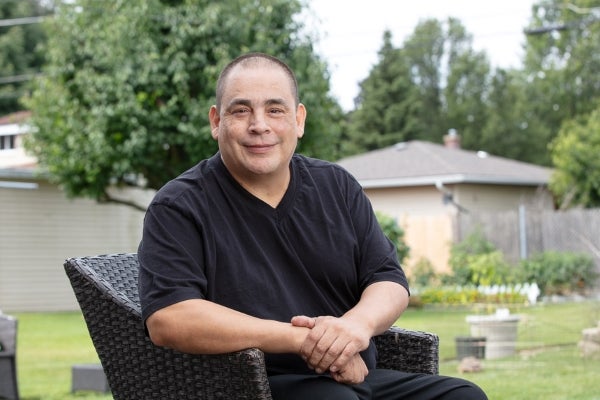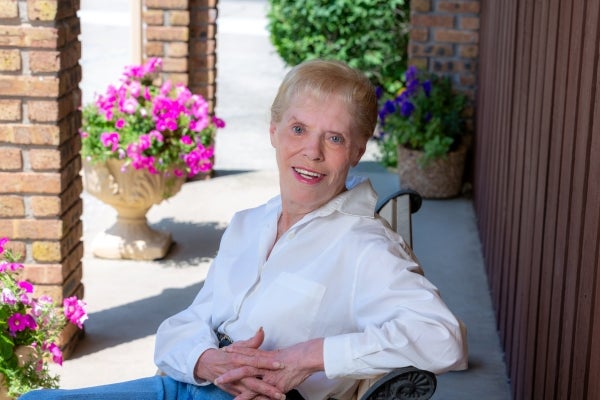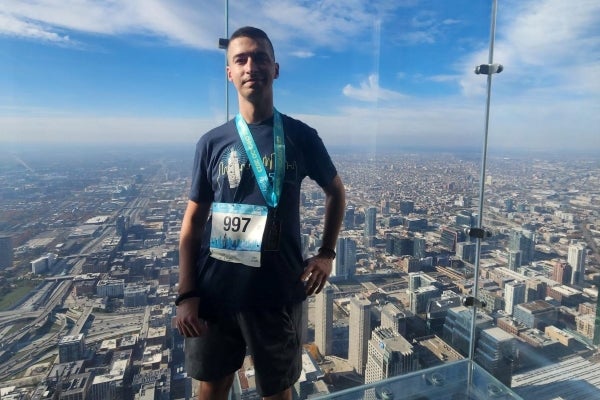Retired Ascension Illinois hospital engineer returns for pancreatic cancer treatment

This Cicero community volunteer survived pancreatic cancer with treatment at Ascension Saint Joseph - Chicago, where he had worked for decades.
There’s staying positive, and then there’s Frank Kraut.
“I'm active, I'm 70 years young and I still cut my own grass. When the snow comes, I'll shovel that,” the Cicero retiree and community volunteer said.
Frank’s neighbors may not share his enthusiasm at the thought of shoveling snow, but he has more than earned the right. In 2021, he was diagnosed with pancreatic cancer, one of the deadliest forms of cancer in the U.S. Thanks to trusted doctors who knew him well and his former workplace, Ascension Saint Joseph - Chicago, he caught the cancer before it had a chance to spread.
Early symptoms of pancreatic cancer
Most patients never see the Ascension Saint Joseph - Chicago that Frank saw for 37 years. As its chief engineer, the hospital for him was a vast underground system of pipes that he’d kept flowing.
But circumstances would bring Frank back after retirement to one of the ORs he’d once kept cool. On May 15, 2021, Frank was at Ascension Medical Group Illinois - Primary Care Chicago to see his primary care provider, James G. Nee, MD, an Ascension Illinois family medicine doctor. Since March, Frank had been losing weight, a pound every two weeks. He had noticed other concerning symptoms: yellow eyes, pale bowel movements, an itchiness all over his body that got worse at bedtime.
“I’d been Frank’s doctor for seven years now, so I immediately noticed the change in his color and energy level,” Dr. Nee remembered. “I’ve also seen similar symptoms in other patients.”
Dr. Nee talked to Frank about those symptoms. When he learned that Frank’s stool had changed in color and that he was not experiencing stomach pain, he arranged for Frank to go to the hospital’s emergency room right away.
“Painless jaundice, or yellowing of the skin and eyes, can be an indicator of pancreatic cancer,” Dr. Nee said. “I knew we needed to work fast.”
A series of imaging tests identified a tumor at the head of Frank’s pancreas. The tumor had pinched a bile duct shut and the buildup of bile in Frank’s bloodstream was causing his jaundice.
ERCP, Whipple procedure and chemotherapy
Frank’s cancer was diagnosed and his bile duct reopened with a procedure known as endoscopic retrograde cholangiopancreatography (ERCP). While he was sedated, a thin tube with a camera at the end was fed down through his throat and stomach. His care team then passed a small device called a stent down this tube and placed it within the affected bile duct.
Once his blood levels returned to normal, Frank was recommended by Dr. Nee to Ascension Illinois surgeon Mark M. Connolly, MD, FACS, an Ascension Illinois surgical oncologist who received his fellowship training at the University of Chicago.
“Dr. Connolly is one of the few surgeons I know who could perform the procedure Frank needed,” Dr. Nee said. Dr. Connolly explained to Frank how they planned to remove the tumor from his pancreas using a technique known as the Whipple procedure.
“The Whipple procedure is one of the most complex procedures a surgeon can perform,” Dr. Connolly explained. “To make sure that the tumor has been completely removed, you have to take out the head and neck of the pancreas, the bile duct, the gallbladder, the duodenum and sometimes part of the stomach. And then you have to put everything back together again.”
Luckily, Dr. Connolly has performed hundreds of Whipple procedures in his career and passes his knowledge onto his residents in the Ascension Saint Joseph - Chicago General Surgery Residency Program. Ascension Saint Joseph - Chicago is one of only four hospitals in Illinois to have been recognized for quality of surgical care in 2022 by the American College of Surgeons National Surgical Quality Improvement Program. The hospital also partners with the University of Chicago Medicine Comprehensive Cancer Center. This has given Chicago’s north side convenient access to UCM’s cancer specialists, as well as a variety of treatments and clinical trials for more than 30 types of cancer. Every service a cancer patient might need — including pharmacies, physical therapy, financial assistance and support groups — is provided within a single modern outpatient center.
“They made me feel very comfortable and trusting of their expertise,” Frank said.
Frank’s Whipple procedure on June 17 took ten and a half hours. As Dr. Connolly and his team worked, a pathologist tested each tissue sample for cancer cells. Frank spent the night in the intensive care unit for observation and was up and walking the next morning — just in time to move to the cancer care unit, where he would stay for another week.
“During my stay, I received the most excellent care from the nursing staff and was visited many times by the surgical team and the hospital’s surgery residents,” Frank said, adding with a laugh. “I do hope I gave them a learning experience.”
It helped that Dr. Connolly had the best possible news for Frank. Cancer had only been detected in the pancreatic tumor. It had not spread to surrounding tissue. To make completely sure that the cancer was gone, though, 12 chemotherapy sessions were scheduled.
Every other Tuesday, from the end of July through mid-January 2022, Frank sat through six hours of infusion therapy, followed by 48 hours of a smaller dose administered through a pump that he wore on his waist.
“For two or three days after each session, I felt like I had a moderate case of the flu,” Frank recalled. “But there were five to six days in between where I felt pretty good.”
Frank credits much of this positive experience to his oncologist, Jessica Garcia, MD. “Her concern for my well-being during treatment showed her love for the patient and her dedication to her profession.”
That attentiveness proved critical before Frank’s final session, when he started experiencing more intense symptoms.
“By the eleventh session, I had no appetite,” he said. “I was extremely cold. I would come downstairs to eat and I would just about fall asleep at the table. All I wanted to do was go back to my bed and cover myself up.”
Frank’s care team noticed instantly how pale and tired he looked, and acted quickly. They determined that Frank had a stomach ulcer, which had caused him to lose blood. He was hospitalized and given a blood transfusion; his final chemotherapy session was canceled.
Frank was overjoyed to learn he was officially in remission. Even better was the news he got from his genetic counselor.
“It was negative, which meant that my cancer was not caused by something in my DNA. When she called me with the results, I actually broke into tears because I have two children and I didn’t want any risk carried on to them,” he said.
Frank Kraut with Cicero Senior Center director Diana Dominick
Making time for family and community
Frank wants to be ready for upcoming trips to Mexico with his daughter and Spain with his wife. He is exercising again, and has regained half of the 50 pounds he lost during treatment. Helping him along in this is the pancreatic enzyme replacement he now takes with meals to help digest fats.
“You can take as many as you need to, so if you have yourself a bone-in steak with gravy and potatoes, and you have a hot fudge sundae for dessert, you might take three pills instead of just one,” he explained.
Frank is thankful for his Ascension Illinois care team, but also for Diana and Larry Dominick, director of the Cicero Senior Center and town president, respectively. Frank and his wife, Josefina, have volunteered at the center for years as commissioners.
“The Senior Center means so much to so many,” he said. “This time, I was the one receiving the support I needed to stay positive. The Dominicks helped Josefina get through my ordeal, too.”
Frank’s experience, even the toughest parts, have shaped his approach as he helps organize health fairs for the center along with excursions and activities.
“Mental health and depression are a serious issue among seniors. They may have lost a spouse or had a medical condition like I did,” he said. “So I share my story with them to help give them hope.”
Dr. Connolly strongly believes that more hope is needed when it comes to pancreatic cancer, even from other doctors.
“Pancreatic cancer is curable with surgery,” he said. “My clinic is full of people who got to live and see their grandkids and enjoy their life.”
Pancreatic cancer is treatable, especially if caught early. Learn about your screening options and find a gastrointestinal cancer specialist near you at ascension.org/ILGIcancer
Last updated: October 14, 2024


